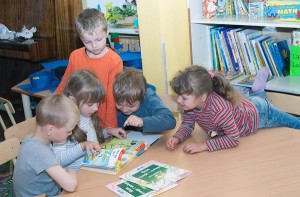- February 3, 2012
- 259
To Kindergartens — according to the new system

The new rules regarding the ways of registration to kindergartens run by self-governments will be in force already in March this year. The waiting lists will now be made not by kindergartens, but self-government. Self-government ensures that the new system will be clearer and will help – at least partly – to solve problems of the existing complicated arrangement and will prevent misuse by kindergartens.
Meanwhile in September, Polish groups will be created in a Kindergarten in Antokol, one of the Vilnius districts, where so far there has been a particular lack of them.
— The registration procedure will be centralised. Children’ kindergartens applications will now be taken from parents by self-government, not kindergartens themselves. That should make this issue significantly easier not only for parents, but also for kindergartens and self-government. In such way, the demand for places at particular insitutions will be known better. Besides, now the applications can be even made online. This is also facilitation for parents – commented the novelty Edita Tamošiūnaitė, Deputy Director of Administration at the Self-government of the city of Vilnius during an interview with “Kurier”.
So far, parents planning to sign up their child to a kindergarten had to register directly at a particular kindergarten. According to the new system, they will only fill up one application instead of few separate to different kindergartens.
As we have been informed by the Deputy Director of Administration of the Self-government, parents will be able to submit an application directly at self-government’s office or fill up an electronic version. In both cases, they will receive a registration number and they will have an access to an internet data base.
— There will be an option to apply for up to five different places. Any ones, according to preferences; But the novelty is that applications will be only accepted from parents, who are planning on giving their child to a kindergarten in the same year. So far, the practice was as follows – parents were signing up their child to a kindergarten few years in advance. Often, they were forgetting to withdraw applications if they were resigning from a particular place. We hope that now, such confusion will be avoided – explained Edita Tamošiūnaitė.
The centralised system will be confirmed by the end of March this year, but the changes will be implemented gradually. Parents, who had already submitted applications, will not have to do it again. Directors of kindergartens are obliged to form groups by mid-February, and they will start functioning from 1st September this year.
In the opinion of Zofia Matarewicz, director of a capital school-kindergarten „Wilia”, the new rules will be a significant facilitation for kindergartens’ administration, but they will not make things simpler for parents.
— Indeed, this will be helpful for us, the kindergartens’ administration. To some extent, this will take away some responsibility from us. As we all now, it has been openly spoken that the previous system was not very transparent, that kindergartens were accepting children according to their own caprice and were even misusing it. However, the new system will not create new places in kindergartens. This problem will remain unsolved. It will also not make things easier for parents, who will have to queue at self-government’s office. The existing rules were good, because we had a direct contact with parents. We could have advised them on different matters, recommend another place, if we run out of places in ours – says Zofia Matarewicz.
On the other hand, in the opinion of Edita Tamošiūnaitė, Deputy Director of Administration of the capital self-government, the new system will prevent misuses by kindergartens. The self-government has also decided to start the fight with parents’ misuses, because the new rules do not allow for any benefits for families, socially supported by the state.
As Tamošiūnaitė said many families hide their real income and as socially supported, they benefit from privileges.
Priority in registration process for kindergartens will only be granted to families with three or more children, children without father, children, whose siblings also attend the same kindergarten, as well as children of employees of the kindergarten and children brought up in families, where one of parents is not able to work in 40%.
As we were informed at the self-government, currently in Vilnius there are 14 kindergartens, which have Polish groups. There are 72 Polish-speaking kindergarten groups in the capital. At the moment, such groups are still particularly needed in districts: Antokol, Zwierzyniec, Bołtupie and Santoryszki. In September this year, Polish groups will be created in the Kindergarten in Antokol.
— The kindergarten „Kaštonas” in Antokol will create few Polish groups in September. Secondary School under the name of Lelewel runs a kindergarten group. This also improves the situation. The kindergarten groups in schools partly solve the existing problem – said Edita Tamošiūnaitė.
Recently, such groups were created in the Primary School under the name of John Paul II in Justyniszki and the Primary School under the name of A. Wiwulski in Żyrmuny.
http://kurierwilenski.lt/2012/02/03/do-przedszkoli-wedlug-nowego-trybu/
Tłumaczenie Małgorzata Juchniewicz w ramach praktyk w Europejskiej Fundacji Praw Człowieka, www.efhr.eu. Translated by Małgorzata Juchniewicz within the framework of a traineeship programme of the European Foundation of Human Rights, www.efhr.eu.

